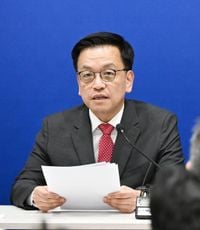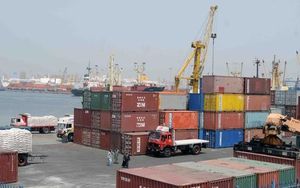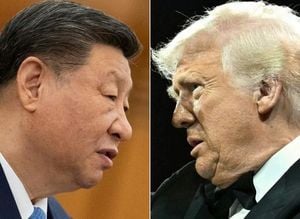On April 24, 2025, South Korea and the United States engaged in high-level trade talks in Washington, D.C., agreeing to collaborate on a "package" agreement regarding new U.S. tariffs and economic cooperation issues by early July. This agreement comes as the Trump administration had recently imposed reciprocal tariffs, including a 25 percent duty on South Korean goods, which were momentarily paused.
During a press briefing, South Korea's Finance Minister Choi Sang-mok stated that the two nations aim to finalize the deal by July 8, 2025, coinciding with the end of the 90-day tariff moratorium imposed by President Donald Trump. The discussions are set to focus on four main categories: tariff and non-tariff measures, economic security, investment cooperation, and currency policies.
As part of this effort, the South Korean industry ministry and the Office of the U.S. Trade Representative (USTR) plan to initiate working-level talks starting the week of April 28, 2025. USTR Jamieson Greer is also scheduled to visit South Korea for high-level discussions during the Asia-Pacific Economic Cooperation (APEC) ministerial talks beginning May 15, 2025.
The recent trade consultations, known as the "two-plus-two" meeting, involved Finance Minister Choi, Industry Minister Ahn Duk-geun, U.S. Treasury Secretary Scott Bessent, and USTR Jamieson Greer. The meeting lasted approximately 85 minutes and was described by Choi as a significant step towards establishing a structured approach for future negotiations.
Choi emphasized that the discussions marked a departure from earlier, less organized talks, stating, "Our side assesses that the two sides have come to share an understanding that they will craft a 'July package' aimed at removing U.S. tariffs on South Korea by July 8 when the pause on reciprocal tariffs ends." He also noted the importance of conducting calm and orderly consultations.
These discussions follow the Trump administration's recent imposition of tariffs, which began with a 25 percent duty on automobiles effective April 3, 2025, and additional tariffs on auto parts set to take effect no later than May 3, 2025. The South Korean delegation has expressed concerns that these tariffs could significantly harm bilateral economic cooperation, particularly impacting the automotive sector.
Choi explained that the South Korean representatives highlighted the potential negative consequences of the tariffs, stating, "We explained (South Korea's) concerns that the imposition of reciprocal and sectoral tariffs could negatively affect bilateral economic cooperation, and we conveyed our position that exemptions and exceptions from tariffs on Korea are needed."
In addition to tariff discussions, the two sides agreed to consult on currency policy, with Choi indicating that the South Korean finance ministry and the U.S. Treasury Department would collaborate on this front. The South Korean delegation urged the U.S. to consider various factors in future negotiations, including South Korea's political schedule and domestic trade-related laws, particularly in light of the upcoming presidential election on June 3, 2025.
Earlier in the day, Treasury Secretary Bessent characterized the trade talks as "very successful," expressing optimism about the progress made. He stated, "We had a very successful bilateral meeting with the Republic of Korea today. We may be moving faster than I thought," indicating that discussions on technical terms could commence as early as next week.
While the U.S. seeks to expedite negotiations, the South Korean delegation has been cautious, maintaining that a slower pace is necessary to accommodate their political landscape. Choi mentioned the "July Paziki Agreement," suggesting that the South Korean side intends to buy time until the tariff moratorium ends.
Experts have weighed in on the implications of these negotiations. Heo Yoon, a professor at Sogang University, predicted that the new government in South Korea would likely request a delay in the re-imposition of tariffs following the presidential election. Meanwhile, Jang Sang-sik, head of the Korea International Trade Association's International Trade and Industry Research Institute, noted the differing approaches between the two nations, stating, "While the U.S. has a strong political and diplomatic motive to show off its early performance with its allies, South Korea decided to leave room for the new government to make a final decision, revealing the temperature difference between the two countries on the timetable."
As negotiations progress, challenges remain. Issues such as defense cost-sharing and the opening of rice and beef imports have not yet been addressed, but they could become significant points of contention. Additionally, the U.S. is expected to press for South Korea's participation in export controls related to China, which poses a dilemma for South Korea given its status as China's top export destination.
Looking ahead, the U.S. Treasury Department is set to release its exchange rate report soon, adding another layer of complexity to the discussions. Choi noted that the U.S. could exert pressure on the South Korean won to appreciate, which could further complicate the negotiations.
In the shipbuilding sector, the South Korean delegation presented a detailed plan that reportedly impressed U.S. officials. The U.S. recognizes South Korea's global competitiveness in high-tech shipbuilding, particularly for constructing and repairing warships. U.S. Secretary of the Navy John Fellen is scheduled to visit South Korea next week to discuss this collaboration further.
As these high-stakes negotiations unfold, the need for bipartisan cooperation among domestic politicians in South Korea is increasingly evident. Professor Heo warned that any shifts in government could complicate negotiations, suggesting that differing opinions could lead to U.S. criticism of South Korea's inconsistent approach.
With the upcoming presidential election and the complexities of the ongoing trade discussions, both sides will need to navigate carefully to protect their national interests while seeking a cooperative resolution.




